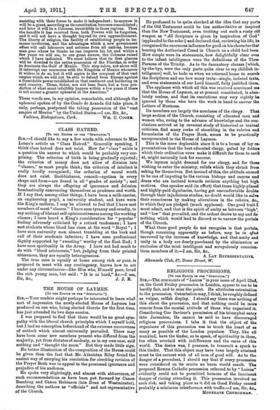THE HOUSE OF LAYMEN.
[To THE EDITOR Or THE "SPECTATOR."' SIR,—Your readers might perhaps be interested to learn what sort of impression the newly-elected House of Laymen has produced on one who, being elected thereto for the first time, has just attended its two days session.
I was prepared to find that there would be no great sym- pathy with the liberal church principles which I myself hold, but I had no conception beforehand of the extreme narrowness of outlook which almost universally prevailed. There may have been some new members present who differed from the majority, yet from dictates of modesty, as in my own case, said nothing and " thought the more." But they made little sign.
No better illustration of the composition of the House could be given than the fact that Mr. Athelstan Riley found the easiest way of carrying his resolution for checking revision of the Prayer Book was to appeal to the presumed ignorance and prejudice of his audience.
He spoke very slightingly, and almost with abhorrence, of such recommendations as have been put forward by Canon Seething and Canon Robinson (late Dean of Westminster), describing the authors as " officials " and not representative pf the Church.
He professed to be quite shocked at the idea that any parts of the Old Testament could be less authoritative or inspired than the New Testament, even trotting out such a rusty old weapon as "AU Scripture is given by inspiration of God" (applauded to the echo !) and declared that, reviewing his life, he recognised the enormous influence for good on his character the, hearing the Authorised Creed in Church as a child had been. How simple were its statements, how delightfully clear eves to the infant intelligence were the definitions of the Three Persons of the Trinity. As to the damnatory clauses [which, by-the-bye, were the only parts quite clear to my childish in- telligence] well, he bade us when we returned home to search the Scriptures and see how many texts—single, isolated texts, and even statements of our Lord himself, fully justified them.
The applause with which all this was received convinced me that the House of Laymen, as at present constituted, is abso- lutely useless, and that its resolutions may very rightly be ignored by those who have the work in hand to answer the Letters of Business.
Its members are largely the nominees of the clergy. That large section of the Church, consisting of educated men and women who, owing to the advance of knowledge and the con- clusions arrived at by reverent study of historical or textual criticism, find many rocks of stumbling in the rubrics and formularies of the Prayer Book, seems to be practically unrepresented in the House of Laymen.
This is the more deplorable since it is to a house of lay re- presentatives that the best educated clergy, galled by fetters which their ordination vows make it difficult for them to cavil at, might naturally look for succour.
We laymen might demand for our clergy, and for those wishing to enter the ministry, reliefs which they shrink from asking for themselves. But instead of this, the attitude seemed to be one of imputing to the various bishops and canons and deans who are inclined towards revision anything but high motives. One speaker said (in effect) that these highly-placed and highly-paid dignitaries, having got uncomfortable doubts through their injudicious studies, no doubt would like to salve their consciences by making alterations in the rubrics, &c., to which they are pledged (much applause). One good trait I must admit, and that is the spirit of amity as between "high'. and " low " that prevailed, and the ardent desire to say and do nothing which would lead to discord or to narrow the portals of the Church.
What these good people do not recognise is that portals, though remaining apparently as before, may be in effect narrowed by the increase of knowledge, and that amity and unity in a body are dearly purchased by the elimination or exclusion of the most intelligent and scrupulously conscien- tious members of it.—I am, Sir, &c., A LAY REPRESENTITIVL Albemarle Club, 37, Dover Street, W.


























































 Previous page
Previous page